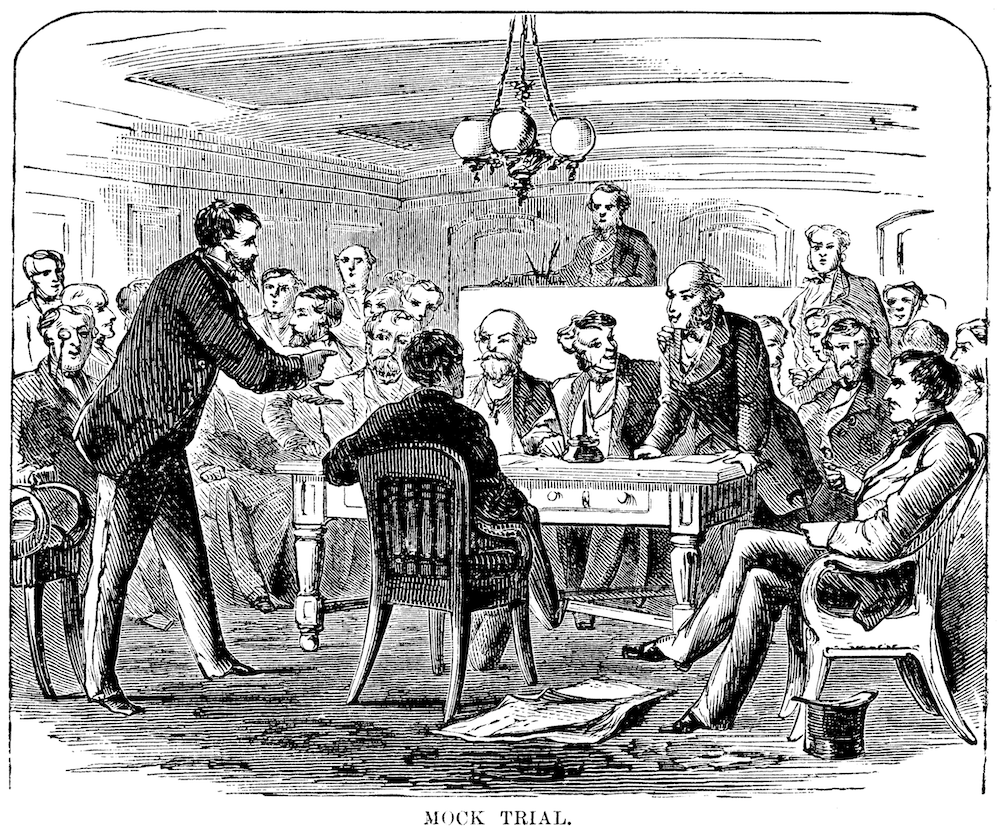Mark Twain’s The Innocents Abroad described the five month journey of dozens of passengers on the Quaker City ship traveling from New York to Europe and the Middle East. While cruising across the Atlantic Ocean out of New York, the Quaker City passengers needed activities to take up the many days it took before they reached their first destination. One of those activities was a Mock Trial, where they set up a trial of the Purser, Robert Vail, for ‘stealing’ a coat from Mark Twain.

Here is the account in The Innocents Abroad:
No ship ever went to sea that hadn’t a mock trial on board. The purser was accused of stealing an overcoat from stateroom No. 10. A judge was appointed; also clerks, a crier of the court, constables, sheriffs; counsel for the State and for the defendant; witnesses were subpoenaed, and a jury empaneled after much challenging. The witnesses were stupid and unreliable and contradictory, as witnesses always are. The counsel were eloquent, argumentative, and vindictively abusive of each other, as was characteristic and proper. The case was at last submitted and duly finished by the judge with an absurd decision and a ridiculous sentence.
Twain leaves out that Stateroom No. 10 was his room, and doesn’t mention who filled each of the roles listed (judge, crier, constables, sheriffs, counsel for the state, counsel for the defendant, witnesses, and jury). However, other passengers recorded the mock trial and added additional (and contradictory) details.
Emily Severance wrote the following in her journal:
For this afternoon’s amusement we are to have “A Trial by Jury.” Mr. Vail, the Purser, is accused of stealing a coat from Mr. Clemens. The “Sheriff,” Mr. Sloat, with the aid the “Constables,” has arrested him, handcuffed him, and taken him off to “Prison” (the Steward’s Closet) in default of bail.
Journal Letters of Emily A. Severance, June 15, pg. 13.
Shortly later she added:
The court was very well conducted, and proved a laughable affair. Mr. Clemens is the ruling spirit and a capital person for ocean life.
Journal Letters of Emily A. Severance, June 15, pg. 14.
Mrs. Mary Mason Fairbanks wrote in a letter to the Cleveland Herald (written June 16, 1867):
Another day we were all summoned to the deck to listen and laugh over a mock trial upon which the legal talent of our passengers had been retained. The whole affair was conducted with ludicrous dignity, and the ingenuity of some of the arguments and the charge of the Judge would reveal some new points to the dignitaries in Cleveland [where Fairbanks was from].
Fairbanks, Mary Mason. “Pilgrimizing”, Cleveland Herald. July 22, 1867, pg. 1.
William E. James recorded the following in his journal:
A trial was held on board of Purser Veil
Notebook kept by William E. James on the Quaker City Excursion, June 15 entry.
Mr. Beach crier of the court
Mr. Crane Judge
Mr. Physician Council for the Prosecution
Mark Twain Council for the defense
William Denny wrote in his journal:
The monotony broken this evening by a Mock trial of one of the ships company for not stealing an Over coat of one of the passengers. A judge selected jury empaneled, the Prisoner brought into court and tried in accordance with the laws governing the Quaker City, wit, tact, oritory & intelegence was displayed by the prosecution & defence, virdict guilty whereupon the judge sentenced the prisoner to solitary confinement in accordance with the laws of the Commonwealth, to room No 10 and to receive nothing but sugar & water for the space of ten minutes
Quaker City Journal of William R. Denny, June 15 entry.
Moses S. Beach wrote in a letter to his newspaper, the New York Sun (Written June 21, 1867):
A part of last Saturday afternoon was devoted to a hastily devised trial of Mr. Vail, the purser, for mistaking Mr. Slote’s coat for one belonging to “No. 10,” and conveying the same to that locality. The Court was organized by appointing:
Beach, Moses. “Mediterranean Bound, No. 7.” New York Sun, 29 July, 1867, pg. 2.
Judge……………..Dr. Crane,
Crier………………Mr. Beach,
Sheriff……………Mr. Slote,
Clerk……………..Mr. Bullard,
Pros. Counsel…Dr. Jackson,
Def. Counsel…..Clemens and Duncan.
In due time but not until after “two retirements” the jury agreed to a verdict of guilty, and the prisoner was sentenced to ten minutes solitary confinement in “No. 10,” whereupon the Court adjourned. The trial created no little amusement and drew smiles from many faces which had not yet forgotten to look pallid.
Finally, Twain’s original recording of the event in his notebook:
Trial in the Circuit Court of the Commonwealth of Quaker City, of Robert Vail, Purser, charged with stealing an overcoat belonging to Sam Clemens. Judge Crane presiding. Henry Bullard Clerk, Dan Slote Sheriff, Moses S. Beach, Crier of the Court, Dr. Jackson, Surgeon of the Ship, Counsel for the State, Sam Clemens & Capt Duncan Counsel for the defendant.—Six Jurymen. Eight witnesses examined. Speeches made. Alibi proven—also insanity of def’t. Verdict guilty, with recommendation of mercy. Sentence inflicted on junior counsel in absence of the criminal—solitary confinement on straight whisky in room 10 for one hour & may God have mercy on your soul.
Mark Twain’s Notebooks & Journals, Volume I, Notebook 8, pg. 336.
It’s interesting to note that while Twain’s notebook contains the most details of the mock trial, Twain significantly simplified his account in the book by not including any names, the verdict, or the punishment. This might be because the punishment he described, drinking whisky in his room for an hour, was cut out along with a lot of the other less reputable stories, to better target a wider audience for the book.
Leave a Reply